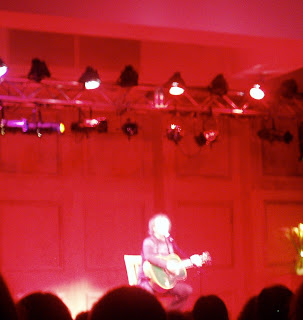
It was the Fairfield court house, clearly dating from another, more prosperous time, when passenger trains stopped at the town’s tracks instead of twenty-two miles to the east in Mount Pleasant. Like many small Midwestern towns, Fairfield is arranged around a large town square. The town boasts a surprising number of restaurants, including a “Thai Deli,” several places specializing in ayurvedic cuisine, and some pleasantly new-age coffee shops. One such spot is Revelations, which is a combined bookstore and wood-oven pizza emporium. Directly across from my hotel was Azteca, a Mexican restaurant. Although I have had bad experiences with “ethnic” cuisine in isolated locales (and airport sushi, but that’s another story) it looked like my best bet to get some meat and hot sauce in my system; the blandness of MUM’s food was beginning to make me feel faint.
After a surprisingly good meal of beef tacos, I retired to my hotel room. The rain had begun again, and I had no desire to tough out the twenty-minute walk back to campus, as I was utterly without umbrella or slicker. Fairfield has no public transportation to speak of; I had made the journey from Mount Pleasant with the aid of a man whose number I had found on the David Lynch Weekend website, who had in turn sent his sister to pick me up at the train station. Through this woman I discovered Fairfield’s intricate network of the retiree chauffers, calm, friendly people who seemed slightly bemused as to what all the fuss about Lynch was. I called her on her cell phone and asked if she would be willing to drive me back to MUM for Donovan’s concert. I felt slightly bad every time I called to ask for a ride, because I knew I would interrupt her gardening or doing something else she enjoyed; her chauffering was incidental, not vocational. Of course, she told me. It would cost me six dollars. On the ride there, she asked me if I thought Lynch’s movies would be in the Fairfield library. “I’d like to watch one,” she told me.
Donovan was to play two concerts over the course of the weekend; one at the Ogden Auditorium, and another at something called the Men’s Dome. Saturday evening’s was in the auditorium, the same smallish room where I had thus far heard Lynch, Donovan, John Hagelin and various others rapturously introduced by Bobby Roth. My overflow badge damned me to the same wait for entry, but I no longer worried that I would have to watch the concert in the empty broadcast tent beside the auditorium which I had yet to enter. A local paper had noted that two Native American school groups were attending the conference, ostensibly because of its emphasis on integrating meditation into education. I recognized the students passing me into the auditorium. Not only were they by far the youngest attendees, but they were herded by a woman who chose her words carefully – “All right, ladies and gentlemen, now I would appreciate it if we could all move in a straight line and quietly towards that door” – and spoke in the measured field trip voice I remembered from my middle school teachers. I settled in the last row of white plastic chairs, a vast improvement over the bleachers from the day before, and waited.
Bobby Roth, glowing in a fashion normally reserved for expectant mothers, took the podium. I regret not bringing a tape recorder to the Weekend, if for no other reason than that I have no recordings of Roth’s introductions. I feel that my descriptions here have reduced them to a ridiculous stream of repetitive superlatives, but in truth they were all distinct, and genuine; Roth truly felt excited and impressed by everyone who spoke. He was a fine speaker, and as a sort of proxy contained the excitement of the entire room. Donovan was praised and feted, his recent history noted, and then the man himself emerged, dressed in rockerly clothes: a close-fitting black sweater with some sort of white pattern and black pants. He carried a green guitar with a small gold emblem of a deer on its body. As the applause soared and Donovan settled in his chair, I glanced around at the crowd. Many couples resembled each other, as a dog begins to look like its owner: pairs of people with lank dishwater blond hair spilling over their collars or wearing matching black jackets, their hands clasped in polite affection. The anxious, calm faces of the teachers in the audience interested in what TM had to offer them bobbed like hopeful lightbulbs over their bodies. Here and there were MUM students, their unlined faces serene in a fashion that belied their youth.

Donovan announced “And I am, the Sunshine Superman,” launching into that song. It was just he and his acoustic guitar – he had no backup band – and his solo performance lent some credence to the somewhat pretentious things he had said in his Q & A about being a troubadour, a single poet, who sang and wrote alone. “Even John [Lennon] and Paul [McCartney] didn’t truly collaborate; each were individual artists,” he had instructed one questioner. His guitar playing was efficient and impressive, and the pall of snark that had fallen on him during his Q&A sessions seemed to lift. My favorite part of Donovan’s music has always been the unexpected sounds with which he dressed up his songs: the hum-om vocal modulation on “Hurdy Gurdy Man,” the organ on “Wear Your Love Like Heaven,” the careening whir on “Sunshine Superman.” Absent these effects, however, his music was just as compelling, stripped of excess but not of feeling. I was struck again by how wonderful his music is for children, not only in its sunny psychedelic subject but also in its repeated belief that everything will be all right. Unfortunately, that part of me that never made a good babysitter when every other twelve-year-old girl in my suburb was raking in the dough ignoring children for a few hours on a weeknight kicked in when the school group behind me screamed in a shrill, alarming tone and clapped offbeat throughout most of the performance. One of them sang repetitive snatches of a Rihanna song.
Here is Donovan’s setlist from Saturday night:
Sunshine Superman
Catch The Wind
Colors
Gentle Heart (a song he explained would be on his new album)
Lalena
Hurdy Gurdy Man
Wear Your Love Like Heaven
Season of the Witch
Jennifer Juniper
The Universal Soldier
Happiness Runs
Encore
A whispery blues song, also on the new album, whose title was not given
Mellow Yellow


Earlier, to a questioner who had wanted to know about his thoughts on performing, Donovan had said “Play three fantastic songs, and then you’ve got them, and you can do whatever you want.” This was precisely what he did in the Ogden auditorium. He had a carefully crafted set of patter that he kept coming between and during the songs. In the middle of “Hurdy Gurdy Man,” Donovan launched into a story about how George Harrison had written a verse of the song when they were in India with the Maharishi. Would we like to hear it, he asked? Well, he would too. Unfortunately, no pen was available when Harrison composed his verse. It wasn’t included in the recorded song, he explained, because at the time London studios required songs to be less than three minutes long. The crowd let out a collective sigh of disappointment. But! Donovan had memorized it, and would sing it for us tonight. It involved time being buried and truth coming to light. “Season of the Witch,” Donovan noted, was Lynch’s favorite of his songs. The audience was often invited to sing along, especially on “Happiness Runs,” a song about meditation that Donovan noted was now being used to sell cereal. I had never heard the song before, but as he instructed us to sing “Happiness runs, happiness runs,” (“First the gents! Now the ladies!") and trilled “Thought is just a little boat upon the sea,” above the crowd’s eager chorus, we all fell into clapping pattycake-style, like a room full of five-year-olds at a singalong. I love concerts, but I’ve rarely felt the sort of togetherness Donovan managed to forge between the Eraserhead devotees, people who had meditated for more than thirty years, and his own bliss-conscious fans. When he left the stage, it was to a roaring ovation.
I had seen Donovan in person once before, in February 2007 at the Anthology Film Archives’ showing of Jacques Demy’s The Pied Piper. The theatre at that cinema is always freezing in the winter, and Donovan emerged on stage to introduce the movie wearing a silky scarf, his hair a dark corona over his black jacket. “In 1972,” he said, “I was the Pied Piper. The question is,” he paused, “Am I still the Pied Piper?” Another pause. “And the answer is yes. I am still the Pied Piper.” He smiled mysteriously and backed into the eaves, moving in a way that reminded me of the albino in Wild At Heart who walks by Sailor and Lula, gesticulating with ecstasy while Koko Taylor performs in a bar in New Orleans.

No comments:
Post a Comment